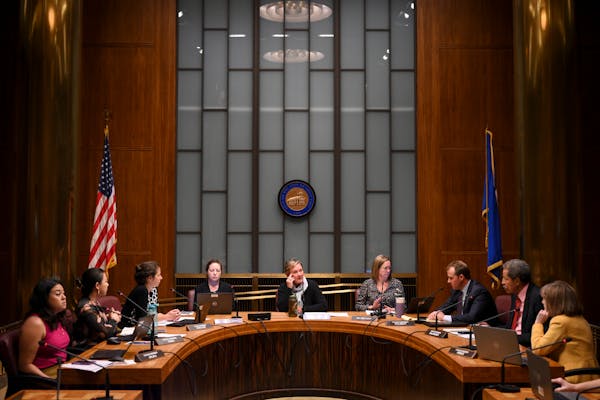For decades, cigar aficionados who wanted to ease into a leather chair and furl their fingers around a tobacco leaf — and put a match to it — had somewhere to go: a cigar lounge.
Their days might be numbered in Minneapolis, as the city is poised to outlaw its last public cigar room, Anthony's Pipe & Cigar Lounge in Uptown.
On Wednesday, a council committee approved a series of changes to the city's tobacco regulations that would make it illegal to "sample" tobacco products in dedicated tobacco stores — an exception in the state's indoor-smoking ban that has allowed people to light up in cigar lounges, hookah bars and some smoke shops since the ban became law in 2007.
The closing of the "sampling loophole," as anti-smoking advocates have come to refer to it, is part of a wider anti-smoking effort that would outlaw discounts and coupons for cigarettes anywhere in the city.
The changes still need the approval of the full City Council and the signature of Mayor Jacob Frey. They're supported by the city's Department of Health, as well as anti-tobacco groups whose members filled the council chambers at City Hall Wednesday to speak in favor of the proposed changes.
"This is going to take away an important tool of the tobacco industry," said Emily Myatt, director of government relations for the American Cancer Society Cancer Action Network in Minnesota. She and others said that in recent years cigarette companies have marketed their products under the radar of the general public with coupons and sales promotions spread via text, email and social media.
Currently, state law sets minimum prices for cigarettes, but retailers are able to offer sales promotions and accept coupons from cigarette companies. The proposed changes in Minneapolis would ban retailers in the city from any such promotions.
Cigar lounges
According to the Minnesota Department of Public Health, smoking lounges are not allowed under the state's Clean Indoor Air Act, which was updated by lawmakers in 2007 to outlaw smoking at bars, restaurants and almost every other place of public accommodation.
However, the vagueness of the exception to "sample" a tobacco product — an argument initially made by sellers of high-end cigars — has effectively stymied regulators when it comes to specialized retailers like cigar shops and hookah stores. After all, when does a sample end?
Minneapolis' Department of Community Planning and Economic Development doesn't track how may cigar and hookah lounges operate in the city because there's no such license. But when they've received complaints about patrons of a tobacconist hanging out and smoking, they've run up against the sampling loophole, officials said.
Bottom line: While the number of cigar lounges has shrunk as stogies have wafted out of style, at least half a dozen bespoke establishments remain in the metro, including Anthony's in Minneapolis, where sofas and chairs provide comfort for a small group of regulars like James Johnson, the only person who spoke against the proposed sampling regulations at Wednesday's hearing.
"Everyone is there on their own accord," Johnson said. "We understand the risk."
A 'sanctuary'
Anthony's has been operating for some 35 years at various locations in the city. In 2016 when Hadi Abou Mourad purchased it, he believed he was operating a legal business — and the lounge part was as integral to the business as the sales counter.
In a letter to the City Council, he described Anthony's as a "sanctuary" for those who enjoy boutique cigars and want to learn what blends of tobacco suit them with like-minded company, amid a robust air-filtering system.
"Only after a full and complete smoke of a cigar can a patron determine the extent of the flavorful and satisfactory nature of a particular cigar," he wrote, adding that he believes banning smoking inside his shop would lead to the "potential evisceration" of his business.
In theory, he could create an outdoor smoking area, become simply a cigar store or move outside the city.
"We have to see," he said in an interview. "I don't know."
In an accompanying letter to the city, his attorney, John Sperry, argued that the proposed city crackdown is unconstitutional because it would interfere with Abou Mourad's lease at 907 W. Lake St., which was presupposed on a legally operating cigar lounge. He wrote that the proposed change "is clearly motivated by a desire to eliminate the city's only cigar shop and lounge."
Council Member LaTrisha Vetaw, who sponsored the ordinance, said her motive was primarily to reduce people getting addicted to smoking and to support workers being subjected to second-hand smoke. "I hadn't even heard of this loophole when I started all this," she said.

Want to share info with the Star Tribune? How to do it securely

'Safe recovery sites' would offer syringes, naloxone and more to people using drugs. The plan could be in peril.
New Minnesota GOP leaders seek peace with party's anti-establishment wing

Who is Republican Lisa Demuth, Minnesota's first House speaker of color?

